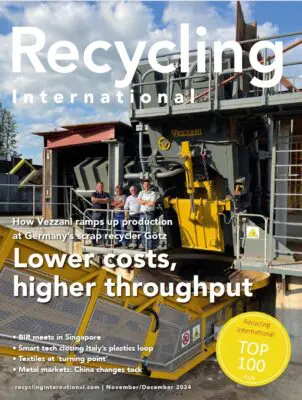48
A U T H O R S Kirstin Linnenkoper, Martijn Reintjes
Chloe Marie Songer (USA)
Songer is the co-founder and ceo of
SuperCircle, located in New York. Her
company looks to boost textile recycling by offer-
ing transparency for producers and MRFs through
reverse vending systems and trade-in options. ‘At
a time when 60% of new textiles hit landfill within
12 months, we’re working to create a world where
no textile is wasted.’ As well as teaming up with
major fashion labels and department stores,
SuperCircle has found partners in companies sell-
ing home decor
and sports prod-
ucts. A recent
example is a
dedicated yoga
mat recycling
scheme,
launched with
Manduka.
Songer’s goal is
to divert 30 bil-
lion garments
from landfill by
2030.
Pascal Leroy (Belgium)
Leroy has overseen operations of the WEEE Forum since 2007.
Besides writing papers on e-scrap and battery recycling, he has
also supervised the innovative research and development Weeelabex proj-
ect, funded from the EU’s Life programme. Leroy’s efforts have been mainly
geared towards fostering understanding between the many different stake-
holders in the recycling sector, creating a European standard of excellence
for e-scrap recycling and promoting EPR schemes. He believes that block-
chain technology will ‘push the boundaries’ of electronics recycling.
Jessica Alexanderson (USA)
Alexanderson is a writer and the found-
er of Recycling Is Like Magic, based in
Seattle. The author of ‘The Girl Who Recycled One
Million Cans’ gained a detailed understanding of
global supply chains by working for shipping com-
pany Green Line for over 15 years. Eager to switch
to a more cre-
ative career, she
created educa-
tional reading
materials for
young people in
2022 and set up
a dedicated
recycling course
at the so-called
Scrap University.
‘Ultimately, I
want to educate
children about
the vital role of
metal recycling
and eliminate
metal waste
from landfills.’
Lisa O’Donoghue (Ireland)
This widely published researcher is taking on liquid-crystal dis-
plays (LCDs) with her company Votechnik. ‘Around 200 million
TVs and 120 million computer monitors are sold globally every year,’
O’Donoghue points out. ‘That’s why I want to create automated plants to
dismantle and depollute flatscreens.’ Her solution, the ALR4000, processes
more than 60 LCD, LED and PC monitors per hour. The system is currently
running at KMK Metals Recycling in Tullamore, Ireland and the recycler
exports LCD screen fractions to Sweden and the US. O’Donoghue’s com-
pany is a spin-off inspired by her work as a materials scientist at the
University of Limerick.
97
98
99
100
28-48_top100.indd 48 21-11-2024 09:32




